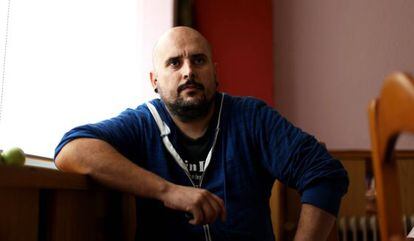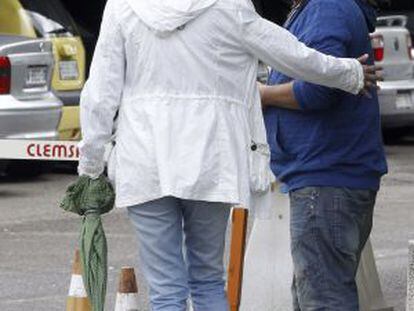“My sister warned me on Saturday: ‘Don’t come and see me’”
The brother of Ebola victim Teresa Romero says his family is planning legal action


José Ramón Romero spoke to his sister Teresa for the last time on Saturday morning. It was around 48 hours before she would be diagnosed as having contracted the Ebola virus. The younger brother of Teresa (he is 40, she is 44), her only sibling, called her on the phone because he knew that she was ill. He had found out from his mother, who lives in Lugo (Galicia).
He could hear that she wasn’t good, and that her voice sounded tired. “The doctors have told me that I have the flu,” she said. He even cracked a joke about the chance she might have contracted the virus. “How could I ever have imagined that this was going to happen?” he says on Thursday afternoon in a cafeteria close to Carlos III Hospital, where Teresa is being treated. “You don’t expect something like this,” he adds, his voice shaking. He had just found out that his sister’s condition had worsened.
José Ramón says he could tell something was wrong when he had that last phone conversation with his sister. He wanted to go and see her at her house on Sunday, and see her dog Excalibur, of whom he was very fond. But Teresa stopped him: “Don’t come here,” she warned, and he was left with the feeling that she was trying to tell him something. “But she didn’t say it. I didn’t insist, and I didn’t give it much more thought – I never could have imagined…” he said, nervously playing with his cellphone, which does not stop ringing.
As a result of that conversation, and the caution that she was taking with him, José Ramón can’t understand why his sister would not have told the doctors who treated her before she was taken into hospital that she had been in contact with Ebola. “I find it really odd that she would not say, ‘Look, this is what’s happening, I’m part of the team that treated the two infected missionaries.’ If she told me not to go to her house, it’s because she suspected she could have been infected,” he concludes.
The Romero family is completely dispirited. José Ramón is confused about the events that have happened since his sister was admitted to hospital. With difficulty, he recounts the phone call he got from his mother on Monday evening telling him the news. “I spoke to Javi,” his mother said, in reference to Teresa’s husband, who is in hospital under observation but is not showing symptoms of the virus. “Tere is infected,” she told him. There was no need to say the word Ebola. Both of them knew the risk that she had taken when she agreed to treat the missionaries with the virus.
I find it odd that she would not say: ‘I’m part of the team that treated the missionaries’”
“I remember that during the August bank holiday I asked her about it back in our village,” he explains. “She told me that they had to follow very strict measures.”
José Ramón watched his sister being transferred to Carlos III Hospital on Monday live on TV, just like any other viewer. Faced with a complete lack of information – “No one has called me, apart from dozens of journalists” – he turned up at the medical center on Tuesday. He wanted to know how she was, in particular because his mother was still in Lugo and he wanted to keep her informed. The first version he was given by the doctor was reassuring. He was told that Teresa was responding well to the treatment, that her condition was stable despite being very serious, but he was also warned that it could get worse in the next few days.
Teresa got considerably worse on Thursday, and the doctor gave José Ramón an honest picture of the situation. “I asked directly, ‘What are the chances that my sister will make it through this?’ I was told the situation was very difficult.” Charo, his girlfriend, who has been at his side throughout this ordeal, is doing her best not to cry.
Charo, his girlfriend, who has been at his side throughout this ordeal, is doing her best not to cry.
His exhaustion does not stop José Ramón from expressing his indignation, and he is demanding that someone take responsibility for the illness of his sister, who is fighting for her life while the authorities blame her for making a mistake when she removed her protective suit. She has even been accused of lying by the Madrid regional health chief when she first spoke to the health services.
The family has already announced that they will take legal action, but they are not optimistic. “I don’t know if I’m going to be able to fight against them, they have all the power,” he says of the Spanish authorities. “They’ll find whatever way they can to put the blame on her.”
“To sum this up, my sister did her job – I don’t know if she was forced to or what – and she has contracted Ebola. There are more people responsible for this than just her. Who decided to bring home the missionaries? It certainly wasn’t my sister. Who decided to bring them, if there’s no cure? It’s very easy to blame the pilot if the plane goes down. But it looks like everything here was done badly. They shouldn’t be able to wriggle out of it,” he concludes.
The consequences of that decision have had a major effect on the family. To make things even worse, José Ramón has just lost his job as a carpenter. The person he was working for on a self-employed basis called him earlier this week and told him not to come back – just in case.











































